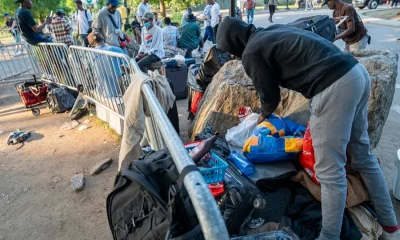International
Who is JD Vance, Donald Trump’s vice presidential nominee?

James David Vance (Ohio, 1984), who was chosen today by Donald Trump as his vice presidential nominee for the race for the White House, was recently described by the Republican leader as a “young Abraham Lincoln” who even “looks good in a beard.”
The detail, though it may seem insignificant, says a lot in this case about the respect that Trump, who is widely known to detest facial hair, now professes for this emerging figure within the party, who went from experiencing a real personal drama and serving as a marine in the Iraq war to becoming a best-selling author.
Long before becoming a senator for Ohio, JD, as he is popularly known, suffered a childhood exposed to violence, guns and drug use in Middletown, his hometown in that state neighboring Pennsylvania, where former President Trump was shot in his right ear this Saturday.
Their grim reality was that of many white families in declining US manufacturing cities in the 1990s.
His parents’ constant bickering led to a divorce, after which JD would begin to use his mother’s surname Vance instead of his father’s Bowman; and his upbringing would fall under the care of his fierce grandmother, whom he called “Mamaw,” whose teachings shaped the person and politician he is today.
In his small town in the Appalachians, little JD Vance learned that you don’t choose your family, but you have to love it anyway, that Christianity was his salvation, and that if he ever failed, there would always be the 19 pistols that “Mamaw” kept at home.
This heritage of traditional values, and the desire for a change of scenery, motivated him to enlist in the US Marine Corps and serve in the Iraq War (2003).
In 2005, his grandmother passed away and JD understood that his military career was over and he had to focus on his studies in Political Science and Philosophy at Ohio State University, which he graduated cum laude, before moving on to Yale Law School.
Echoes of that “white trash” childhood – a derogatory term used in the country to refer to lower-class and dysfunctional families – resonated once again in JD’s head a decade later, choosing to put aside his buoyant jobs among California law firms and technology companies to write his memoirs.
Titled ‘Hillbilly Elegy’, they were published in 2016 by HarperCollins and were a hit in the publishing industry from the start.
Media such as The New York Times and CNN, where he would soon become a political commentator, enshrined the virtues of a work with such an impact that it made its way into the presidential battle between Trump himself and Democrat Hillary Clinton, and in 2020 it would arrive as a film on Netflix.
“I can’t stand Trump. I’m afraid he’s taking the white working class into a very dark place,” Vance said in an interview with NPR in 2016.
Until then, JD had shown a more moderate and socially-minded profile, even founding an NGO to protect children who are victims of difficult environments like his own, but in recent years he has been shifting towards a conservatism more in line with the MAGA (‘Make America Great Again’) core.
“My uncle just asked me if I was glad I won. If I hadn’t, it would have been another terrible homecoming. In the Vance family , we always pay attention to the important things,” said JD, laughing, upon winning the seat of senator for Ohio in 2022.
Once in office, he publicly apologized to Trump for his 2016 statements, calling them “a mistake.”
He has recently strongly defended Israeli attacks on Gaza and harshly criticized the Biden administration for its economic management.
Father of three children and married to a woman of Appalachian Indian origins, Vance now faces another major life challenge subject to the unpredictable Trump and his way of working in teams, which has made the figure of the vice president a somewhat irrelevant position; see the case of Mike Pence.
“JD is kissing my ass because he needs my support,” said the former president when the vice president – if there is a Republican victory – joined the race for the Senate.
Months later, at a joint event in East Palestine, Ohio, they closed ranks, criticizing Biden for the derailment of a chemical train, and Trump defined JD as “a young star, a great senator and a true fighter” whose bushy beard doesn’t bother him.
International
Thousands rally nationwide against Trump’s threat to U.S. democracy

Thousands of protesters gathered on Saturday (April 19, 2025) in major cities like New York and Washington, as well as in small communities across the United States, in a second wave of demonstrations against President Donald Trump. The crowds denounced what they view as growing threats to the country’s democratic ideals.
In New York City, demonstrators of all ages rallied in front of the Public Library near Trump Tower, holding signs accusing the president of undermining democratic institutions and judicial independence.
Many protesters also criticized Trump’s hardline immigration policies, including mass deportations and raids targeting undocumented migrants.
“Democracy is in grave danger,” said Kathy Valyi, 73, the daughter of Holocaust survivors. She told AFP that the stories her parents shared about Adolf Hitler’s rise to power in 1930s Germany “are happening here now.”
In Washington, demonstrators voiced concern over what they see as Trump’s disregard for long-standing constitutional norms, such as the right to due process.
International
ACLU seeks emergency court order to stop venezuelan deportations under Wartime Law

The American Civil Liberties Union (ACLU) on Friday asked two federal judges to block the U.S. government under President Donald Trump from deporting any Venezuelan nationals detained in North Texas under a rarely used 18th-century wartime law, arguing that immigration officials appear to be moving forward with deportations despite Supreme Court-imposed limitations.
The ACLU has already filed lawsuits to stop the deportation of two Venezuelan men held at the Bluebonnet Detention Center, challenging the application of the Alien Enemies Act of 1798. The organization is now seeking a broader court order that would prevent the deportation of any immigrant in the region under that law.
In an emergency filing early Friday, the ACLU warned that immigration authorities were accusing other Venezuelan detainees of being members of the Tren de Aragua, a transnational criminal gang. These accusations, the ACLU argues, are being used to justify deportations under the wartime statute.
The Alien Enemies Act has only been invoked three times in U.S. history — most notably during World War II to detain Japanese-American civilians in internment camps. The Trump administration has claimed the law allows them to swiftly remove individuals identified as gang members, regardless of their immigration status.
The ACLU, together with Democracy Forward, filed legal actions aiming to suspend all deportations carried out under the law. Although the U.S. Supreme Court recently allowed deportations to resume, it unanimously ruled that they could only proceed if detainees are given a chance to present their cases in court and are granted “a reasonable amount of time” to challenge their pending removal.
International
Dominican ‘False Hero’ Arrested for Faking Role in Nightclub Collapse That Killed 231

A man identified as Rafael Rosario Mota falsely claimed to have rescued 12 people from the collapse of the Jet Set nightclub in Santo Domingo—a tragedy that left 231 people dead—but he was never at the scene.
Intelligence agents in the Dominican Republic arrested the 32-year-old man for pretending to be a hero who saved lives during the catastrophic incident, authorities announced.
Rosario Mota had been charging for media interviews in which he falsely claimed to have pulled survivors from the rubble after the nightclub’s roof collapsed in the early hours of April 8, during a concert by merengue singer Rubby Pérez, who was among those killed.
“He was never at the scene of the tragedy,” the police stated. The arrest took place just after he finished another interview on a digital platform, where he repeated his fabricated story in exchange for money as part of a “media tour” filled with manipulated information and invented testimonies.
“False hero!” read a message shared on the police force’s Instagram account alongside a short video of the suspect, in which he apologized: “I did it because I was paid. I ask forgiveness from the public and the authorities.”
-

 Central America5 days ago
Central America5 days agoPetro questions Ecuador’s vote, cites reports of military control and arrests
-

 International4 days ago
International4 days agoArsenal stun Real Madrid at the Bernabéu to reach Champions League semifinals
-

 International3 days ago
International3 days agoDominican ‘False Hero’ Arrested for Faking Role in Nightclub Collapse That Killed 231
-

 Central America3 days ago
Central America3 days agoNicaraguan Exiles to Mark 7th Anniversary of 2018 Protests with Global Commemorations
-

 International4 days ago
International4 days agoBogotá residents line up for yellow fever vaccine amid national alert
-

 International2 days ago
International2 days agoACLU seeks emergency court order to stop venezuelan deportations under Wartime Law
-

 International4 days ago
International4 days agoDeSantis’ immigration crackdown sparks alarm in Venezuelan Communities in Doral
-

 Central America2 days ago
Central America2 days agoUN complaint filed against Costa Rica over detention of migrant children
-

 International4 days ago
International4 days agoMexico refuses to restore ties with Ecuador while Noboa remains in office
-

 International15 hours ago
International15 hours agoThousands rally nationwide against Trump’s threat to U.S. democracy
-

 International5 days ago
International5 days agoColombia: Search continues for missing limb of italian scientist found dismembered

































